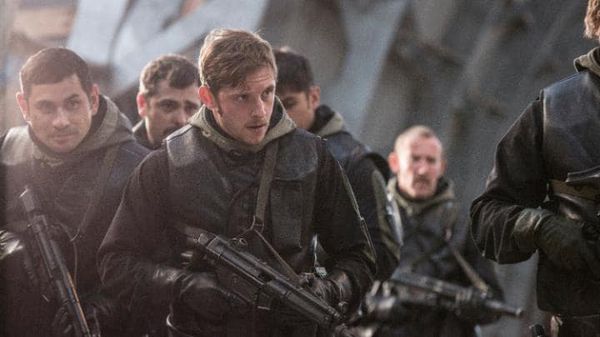Eye For Film >> Movies >> 6 Days (2017) Film Review
6 Days
Reviewed by: Jennie Kermode

On the 30th of April 1980, the Iranian Embassy in London was stormed by a group of armed men who siezed control of the building and took 26 people hostage. The group declared itself part of the Democratic Revolutionary Front for the Liberation of Arabistan, an area in southern Iran, and demanded the release of prisoners from that area held by the Iranian state. The British government was caught in the middle during the six day stand-off that followed, before a daring raid took place that, as the first action of its kind ever broadcast live on the BBC, had a striking effect on the public consciousness and turned the hitherto little known SAS into legends.
Toa Fraser's film aims to recreate these historically pivotal days whilst stripping away some of the glamour and mystique that has grown up around them. It's buoyed up by a high capable cast, with Abbie Cornish framing events as a young Kate Adie (laying into a Daily Mail reporter with a vigour that still resonates today), and with an impressive central performance from Mark Strong as Max, the man suddenly landed with the job of talking to the hostage takers and trying to keep the situation calm. The relationship that he builds up with their spokesman, Salim (Ben Turner) brings a steadying note of pathos to the film, as a genuine sympathy grows between them despite Max's increasing awareness that his superiors intend to bring the situation to a violent end.

Doubtless some will shrink back at the notion of sympathy for terrorists, but the film takes pains never to present them in a one sided way, with Salim's colleague Faisal (Aymen Hamdouchi) considerably more trigger-happy. The SAS soldiers who know they may have to go in see them as soldiers caught up in a situation much bigger than themselves. There is perhaps a hint of whitewashing here - in actuality some SAS soldiers were suspected of using unjustifiable force - but there is far less sympathy for the higher-ups whose focus is on managing the political outcome. We never see Margaret Thatcher directly (there's a cameo by Tim Pigott-Smith as her deputy, Willie Whitelaw) but her presence is very much felt - as a new prime minister suspected of weakness by virtue of her sex, she has a lot invested in using the situation to make herself seem tough.
Viewers who remember their television programmes suddenly cutting out that bank holiday weekend to be replaced by footage of back-clad men abseiling down a building will find bittersweet nostalgia here. An introductory montage of news and current affairs programmes helps provide context and will leave you feeling surprised that some presenters ever looked that young. We see more of these intermittently throughout the film, alongside clips of Alex Higgins beating Kirk Stevens in the Embassy World Snooker Championship and going on to lose to Cliff Thorburn in the final. This was not a time for people's champions. The world was in a volatile state. Americans were talking about putting an actor in the White House. No-one knew if the post-revolutionary Iranian regime would manage to remain in power for long. The ambitions of the hostage takers were desperately naive.
Although the action is there in spades when the moment comes, Fraser bides his time, and overall this has more of the atmosphere of a spy thriller than a straight-out action film. It's nuanced and thoughtful, alert to the individual suffering behind the headlines, cogniscent of the bigger picture. This may or may not endear it to audiences but it provides it with a depth that will give it staying power. Fraser makes good use of stately Georgian and Victorian buildings which dwarf their inhabitants. The sky is an expressionless grey. On the fifth of May, the world was watching, but how much did it see?
Reviewed on: 14 Aug 2017















